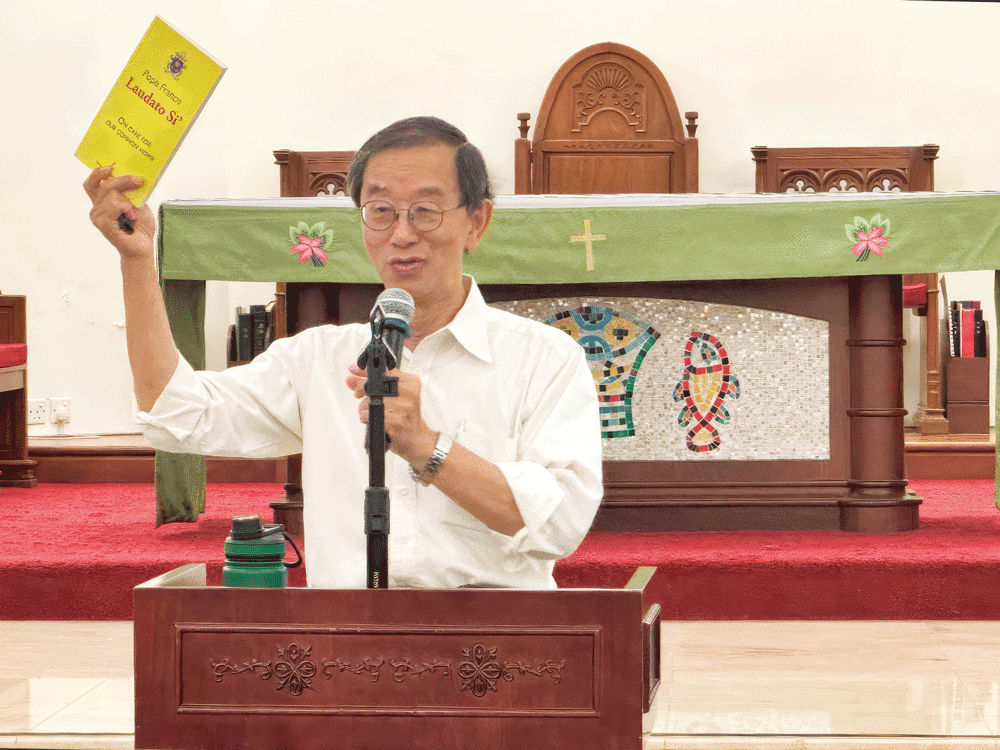HONG KONG (SE): In celebration of the tenth anniversary of Laudato Si’, the late Pope Francis’s landmark encyclical on care for our common home, a thought-provoking discussion took place on June 10 at All Saints’ Cathedral of the Anglican Church in Mongkok.
Organised by the Diocesan Commission for Integral Human Development in cooperation with Protestant environmental groups, the event aimed to deepen awareness around environmental justice and inspire participants to embrace ecological conversion—a call deeply rooted in Laudato Si’, urging a transformation of the human heart in relationship to creation.
Linking eco-friendly practices to everyday needs
Among the speakers was Lam Chiu-ying, meteorologist and former director of the Hong Kong Observatory, who addressed the devastating impacts of consumerism, globalisation, and unchecked capitalism on both the environment and society.

He highlighted the sharp rise in global temperatures since the 1970s, attributing it to consumer-driven cultures fuelled by mass media and advertising. “The consumption process involves exploiting nature, as natural resources are used to create products sold to consumers,” he said.
Lam criticised the practice of outsourcing pollution, where affluent nations shift manufacturing to developing countries for lower costs, while simultaneously blaming them for environmental damage.
The consumption process involves exploiting nature, as natural resources are used to create products sold to consumers
Lam Chiu-ying
The extraction of primary materials, he noted, surged from 22 billion tonnes in 1970 to 70 billion tonnes by 2010. The rise of fast fashion and an aggressive consumer culture, he warned, not only depletes resources but also leaves behind a psychological void.
Quoting from Laudato Si’ #158, Lam echoed Pope Francis’s message that “strategies for a solution demand an integrated approach to combating poverty, restoring dignity to those excluded, and simultaneously protecting nature.”
He stressed that rather than demanding immediate behavioural change, ecological awareness should be cultivated through building trust and linking green practices to everyday benefits. As an example, Lam shared how setting his air conditioner to 27°C not only saves energy and lowers costs but also reduces the risk of catching a cold.
Scientist urges for sustainable diets
Professor Amos Tai of the Earth and Environmental Sciences Programme at the Chinese University of Hong Kong offered a scientific perspective.
He warned that while the Earth may have been warmer during the dinosaur era, 2025 is expected to be the warmest period in human history, with the highest rate of climate change ever recorded.
[Amos Tai] warned that while the Earth may have been warmer during the dinosaur era, 2025 is expected to be the warmest period in human history, with the highest rate of climate change ever recorded
He introduced the planetary boundary theory and explained the risks of crossing ecological thresholds, particularly in biodiversity and nitrogen use. Tai pointed to the plight of low-lying nations like Kiribati, threatened by rising sea levels, and how erratic weather patterns in regions like eastern Uganda make farming akin to gambling.
Focusing on the role of agriculture in emissions, Tai advocated for sustainable diets. He shared that he personally avoids beef and chooses more white meat as a way to reduce his environmental footprint. True ecological conversion, he noted, arises not from guilt or obligation, but from inner conviction and a deeper bond with creation.
Saving the earth like the Good Samaritan
Auxiliary Bishop Joseph Ha Chi-shing shared a theological and pastoral reflection, urging attendees to see nature not as a resource to dominate, but as family to love and protect—echoing the spirituality of St. Francis of Assisi.
He drew a powerful analogy from the Parable of the Good Samaritan, suggesting that Earth today resembles the injured man left on the roadside, wounded by human greed and carelessness. Quoting a report from the World Wide Fund for Nature, Bishop Ha noted that if current consumption patterns continue, humanity will require two Earths by 2030 to sustain its needs.
[Bishop Ha] drew a powerful analogy from the Parable of the Good Samaritan, suggesting that Earth today resembles the injured man left on the roadside, wounded by human greed and carelessness
He urged the faithful not to “walk past” the suffering of creation with indifference, but to allow compassion to drive concrete action. “Seeing and compassion go hand in hand,” he said, warning against spiritual blindness and calling for hearts open to ecological suffering.
Clarifying a common misinterpretation of scripture, Bishop Ha reminded that “governing the Earth” means stewardship, not dominion. He encouraged faithful sacrifice and self-discipline as essential to authentic ecological concern.
He concluded by calling for a faith-filled lifestyle shaped by contentment, simplicity, and reverence for all living beings. “We should love not only fellow humans but all creatures, because we are one family,” he said. “Spiritual growth means learning to see and cherish nature. One way to love nature is to be content with what we have.”










